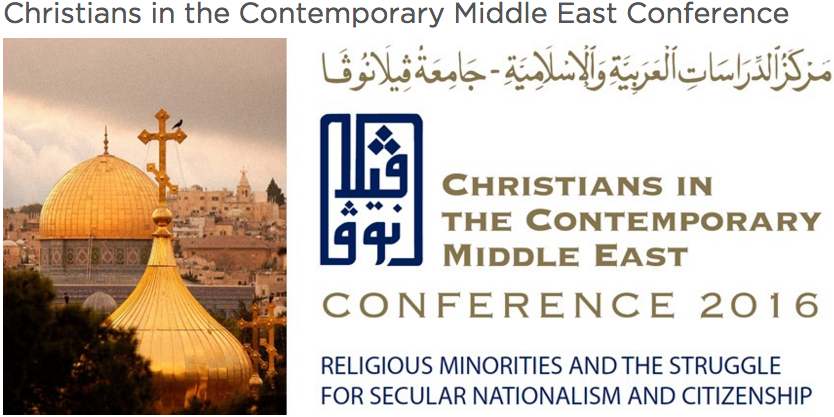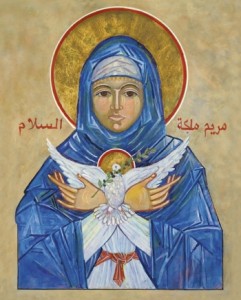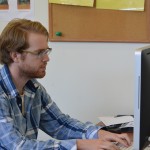Dig Deeper: Christians in the Contemporary Middle East Conference
Villanova University will host a conference on Dec. 5-6 titled Christians in the Contemporary Middle East: Religious Minorities and the Struggle for Secular Nationalism and Citizenship. With such wonderful speakers attending as Retired General Anthony Charles Zinni (USMC) and Ussama Makdisi of Rice University, the conference promises some elucidating conversation.
For a conference on such a particular subject, the presentations will cover a diverse range of topics. Attendees will hear such intriguing talks as “Christian Contributions to Art, Culture and Literature in the Arab-Islamic World” and “The Impact of the Shia-Sunni Political Struggle and Future Strategies for Christians and Other Minorities in the Middle East.”
Specialized lectures such as these sometimes require a little bit of background information, and some students may be wondering the relevance of these topics to their lives or academic development. I had similar questions and concerns and brought them up with Assistant Director of Academic Integration and Theology Librarian Darren Poley.
(Cover of illustrated edition of Universal Declaration of Human Rights from website below)
“Religious liberty is not just an American or even an exclusively Western concept,” he began. “Freedom to practice one’s faith or belief system is an intrinsically human desire.”
Poley recommends taking a look at the UN’s Universal Declaration of Human Rights if you’re interested in why the Villanova University should be concerned about the Middle East. It’s available here, and Poley reminds you, “especially since we live in an increasingly interconnected and globalized society: no one can afford to ignore any lack of respect for people, property, social justice or the integrity of creation anywhere in the world.”
Dig Deeper by investing these associations, centers and initiatives for social justice:
- Catholic Near East Welfare Association (CNEWA)
- Center for Peace & Justice Education, Villanova University
- National Interreligious Leadership Initiative for Peace in the Middle East (NILI)
- Palestine Israel Ecumenical Forum (PIEF)
- Pontifical Council for Justice and Peace
“It surprises most students to learn that the Middle East and North African were predominantly Christian lands for the centuries between the official toleration of Christianity in the Roman Empire in the 4th century and the rise of Islam in the 7th century,” Poley continued.
(Villanova University’s Arabic Cartouche)
It’s important for Villanova students to think about the decline of pluralistic spaces in the Middle East because so many of these early Christian societies remain today, albeit under different leadership and sometimes different names.
“Nestorian Christians in the Middle East established themselves in the 5th century and continue as the Assyrian Church of the East.” Poley highlighted, and “there are many different Eastern Orthodox churches often along ethnic or national lines that are affiliated with the Ecumenical Patriarch of Constantinople, a Turkish citizen who resides in Istanbul.”
(Banner for the Ecumenical Patriarchate – website below)
In addition, there are Catholics outside of the Latin Rite tradition. The Maronites of Lebanon, the Chaldeans of Iraq, and the Melkites from Syria, Jordan and Israel represent the largest groups of such.
Poley said, “There are also small groups of Christians in the Middle East with doctrinal differences from either the Catholic of the Eastern Orthodox churches, which are collectively called the Oriental Orthodox churches; the three major ones being the Syrian, Armenian, and Coptic (Egyptian).”
Despite the complexity of their histories, you may find statistics and information on the individuals and groups of Christians who continue to “live, work, worship, and coexist alongside Muslims and Jews in Middle Eastern countries,” according to Poley, at these websites:
- http://news.assyrianchurch.org/
- https://www.patriarchate.org/
- Statistics via United States Conference of Catholic Bishops
An encyclopedia of knowledge on the topic, Poley provided me with an exhaustive list of thinkers, theologians and writers who have promoted religious diversity in the Middle East. I’ve included just a few of those thinkers below so that you may familiarize yourself with them before the conference:
- Saint Pope John Paul II
- Pope Emeritus Benedict XVI
- Eastern Orthodox Ecumenical Patriarch Bartholomew I
- Catholic Patriarch Emeritus of Jerusalem Michel Sabbah
- Latin Patriarchal Vicar for Jerusalem and Palestine William Shomali
- Melkite Archbishop George Wadih Bakouni
- Antiochian Orthodox Bishop George Khodr
- Coptic Orthodox Bishop Barnibas El Soryany
- Armenian Bishop of Damascus Armash Nalbandian
- Father Kail C. Ellis, OSA, Villanova University.
Yes, that’s the abridged list. In case you were wondering if you should visit a subject librarian before collecting research for your next term paper: yes, you should. Poley, and indeed all of our subject librarians, work tirelessly to keep up-to-date on current events, research, and research methodologies.
(This is what Darren Poley looks like, in case you go looking for him.)
They also keep tabs on the library collection and can direct you to books and journals available either here at the Falvey or through the library’s databases. I asked Poley: what library resources are available for students to learn about the prospects of and strategies for promoting piece in the Middle East?
He suggested looking at the Theology & Religious Studies and Cultural Studies subject guides and reading one, some, or all of the following:
- Defining neighbors: religion, race, and the early Zionist-Arab encounter
- Dining with al-Qaeda: three decades exploring the many worlds of the Middle East
- Holy war, holy peace: how religion can bring peace to the Middle East
- Islam, Judaism, and the political role of religions in the Middle East
- Islamic Jerusalem and its Christians: a history of tolerance and tensions
- Religious fundamentalism in the Middle East: a cross-national, inter-faith, and inter-ethnic analysis
- Religious minorities in the Middle East: domination, self-empowerment, accommodation
- Religious origins of nations?: the Christian communities of the Middle East
- And the Journal for Peace & Justice Studies
For some students, including me, starting to read up on Middle Eastern Christianity would be difficult without some background on Middle Eastern geopolitics. I submitted the same question to Poley about library resources for looking at the geopolitical landscape of the Middle East. He suggested starting with the Political Science Subject Guide and the History Subject Guide, but also directed me to these books:
- Forces of fortune: the rise of the new Muslim middle class and what it will mean for our world
- Middle Eastern minorities and diasporas
- Politics of modern Muslim subjectivities: Islam, youth, and social activism in the Middle East
- Religion and politics in the Middle East: identity, ideology, institutions, and attitudes
- The politics of secularism in international relations
- Understanding the contemporary Middle East
- Violence, nonviolence, and the Palestinian national movement
- Women’s roles in the Middle East and North Africa
- And the Journal of South Asian and Middle Eastern Studies
Speaking of the UN’s Universal Declaration of Human Rights, Poley said, “So in the middle of the 20th century, perhaps the bloodiest in history so far in terms of wars and other violence, people of good will came together to publically declare among other tenets that freedom of conscience and religion is a basic human right.” Described as “timely and riveting” by the university’s poster, this conference may be an excellent opportunity for the Villanova community to validate these tenets.
Article by William Repetto, a graduate assistant on the Communications and Marketing Team at the Falvey Memorial Library. He is currently pursuing an MA in English at Villanova University.
0 Comments »
No comments yet.
RSS feed for comments on this post. TrackBack URI





